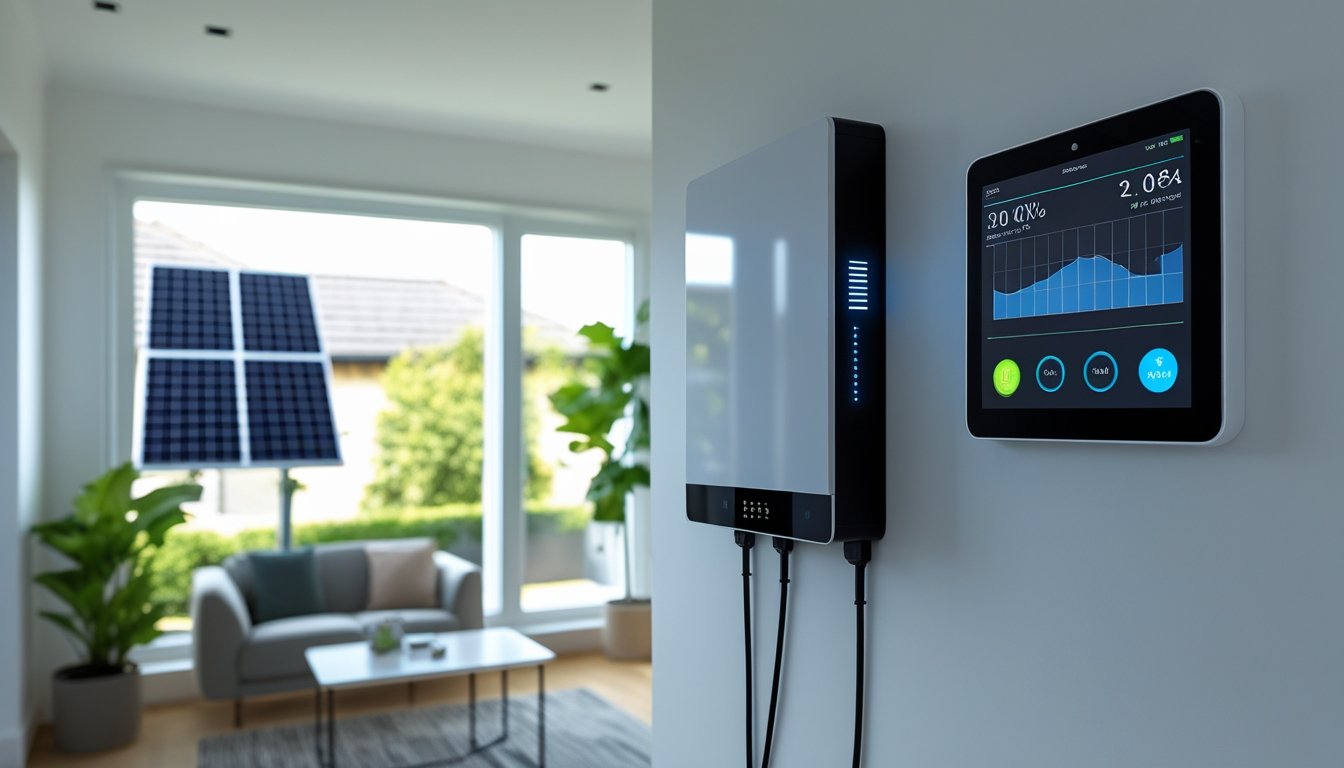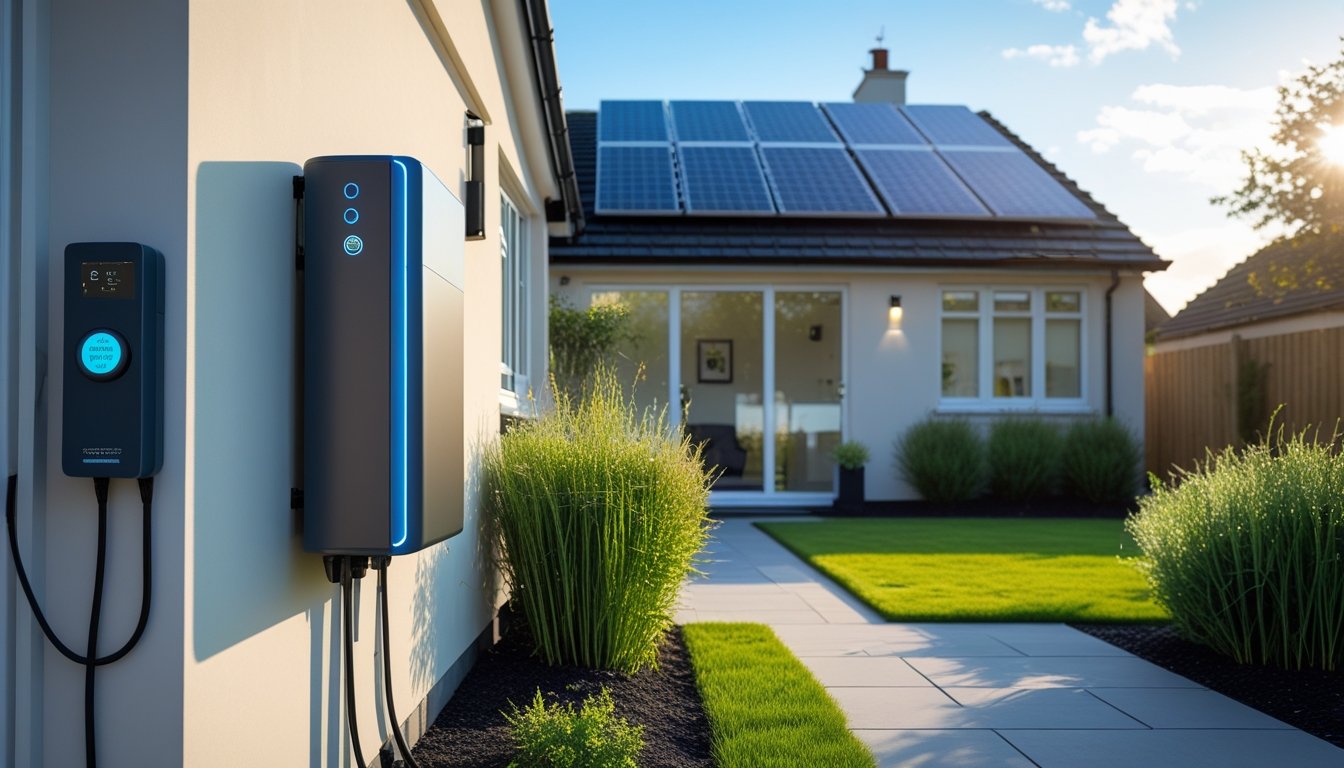Late updated: 11 May 2025 09:05
Written by: Eleanor Hartman
Choosing The Right Energy Storage System For UK Homes: A Comprehensive Guide
In the rapidly evolving energy market, selecting the right energy storage system for our homes is vital for managing energy use efficiently and reducing costs. Whether we are looking to store solar energy or manage energy usage more effectively, understanding the optimal technology for our specific needs is crucial. Choosing the right energy storage system involves evaluating factors like capacity, performance, budget, and maintenance requirements to ensure it aligns with our household's energy needs.

The UK offers a variety of home battery storage solutions, each with unique advantages and considerations. We must assess our available space, the energy requirements of our household, and the compatibility with existing systems. These aspects will guide us in selecting the system that not only meets our current needs but also offers long-term benefits.
By exploring the options available and understanding the features that matter most, we can make an informed decision that enhances energy efficiency and supports sustainable living. This journey of discovery will help us make choices that not only improve our energy independence but also contribute to a greener future.
Key Takeaways
- Evaluate energy storage capacity and performance for your needs.
- Consider space, budget, and maintenance needs for efficient storage.
- Select systems that are compatible with existing setups.
Key Considerations When Choosing a Home Energy Storage System
Choosing the right home energy storage system involves evaluating multiple factors such as technology types, energy consumption patterns, and financial implications. By understanding these elements, we can ensure the system meets our needs.
Types of Energy Storage Technologies
When selecting an energy storage system for our UK homes, we should consider the available technologies. The most common types are lithium-ion, lead-acid, and saltwater batteries. Lithium-ion batteries are popular due to their high energy density, longer lifespan, and efficiency. They are lightweight and require less maintenance compared to other options.
Lead-acid batteries are a more traditional choice, offering lower upfront costs but generally having a shorter lifespan and requiring regular maintenance. They are suitable for homeowners with lower energy demands and budget constraints. Saltwater batteries, an emerging technology, provide a non-toxic alternative with promising durability and safety features, although they can be larger and less energy dense. Choosing the right type depends on factors like our home's energy needs, space availability, and preference for sustainability.
Assessing Your Household’s Energy Consumption and Demand
Understanding energy consumption patterns is vital. We need to evaluate when and how much energy we use daily. This helps in choosing a system that matches our peak energy demands. By analysing past energy bills and possibly utilising smart meters, we can determine periods of high usage.
Knowing our peak power demand is crucial when selecting battery capacity. Ensuring the energy storage system covers these peaks can lead to higher self-consumption of renewable energy, enhancing energy independence. An effective energy management system can help us optimise the use of stored energy, reducing reliance on the grid and lowering energy costs.
Budget, Energy Costs and Return on Investment
Financial considerations play a significant role in the decision-making process. We must assess how much we are willing to invest. The cost of energy storage systems varies by technology and capacity. Establishing a budget helps narrow down options and identify potential savings.
While initial costs may seem daunting, factoring in energy cost savings and potential incentives, such as solar grants or feed-in tariffs, is essential. Calculating the return on investment involves understanding these savings over time. By considering long-term savings, we can make an informed decision that aligns with our financial goals and supports sustainable energy use in our homes.
Comparing Home Energy Storage Solutions in the UK

Selecting the right energy storage system for UK homes involves evaluating multiple factors. These include the type of battery technology, integration with solar and renewable energy sources, inverter choices, and reliability and safety standards. Exploring additional features like EV charging and energy management is also essential.
Lithium-Ion vs Other Battery Types
We often find that lithium-ion batteries dominate home energy storage due to their efficiency and long lifespan. These batteries offer high energy density, making them ideal for residential use where space might be a constraint. Compared to lead-acid batteries, lithium-ion units require less maintenance and offer faster charging cycles.
Despite the benefits, alternatives like flow batteries are gaining traction. Flow batteries, although larger and costlier upfront, provide better scalability for those with significant energy storage needs. Their lifecycle can outlast lithium-ion, making them appealing for long-term investments.
Assessing battery options involves balancing cost, efficiency, and maintenance requirements.
Integrating Energy Storage with Solar Power and Renewable Energy
Pairing energy storage systems with solar power enhances household energy independence. The synergy between storage systems and solar panels allows us to store excess energy generated during sunny periods. This stored energy can then be used during the night or cloudy days, reducing reliance on the grid.
Incorporating other renewable energy sources like wind can provide additional benefits. In the UK, where weather can be unpredictable, having an integrated system can stabilise energy supply. Using energy management systems, homes can optimise power usage, thereby minimising the carbon footprint.
Strategically leveraging these integrations ensures consistent power supply and maximises renewable energy utilisation.
Inverter Options: Standard, Hybrid, and Compatibility
Choosing the right inverter is crucial for compatibility and efficiency. We have standard inverters which convert the DC power from batteries to AC power usable in homes. However, hybrid inverters cater to more complex needs by integrating both solar panels and battery storage.
Hybrid inverters can simplify installation and may seem more expensive initially, yet they often reduce total investment over time. Compatibility with existing systems is vital to avoid unnecessary expenses. Always check whether an inverter supports future expansions or additional components like EV chargers before purchase.
Selecting an appropriate inverter ensures not only effective energy conversion but also long-term flexibility.
Backup Power and Emergency Preparedness
Energy storage systems provide crucial backup during power outages. Having a reliable emergency backup can be the difference during extreme weather conditions or grid failures. The capacity of the battery pack determines how long essential appliances stay operational.
Systems designed with backup functionality can offer peace of mind. Features like automatic switchover to battery power during an outage make these systems user-friendly. Emergency preparedness involves choosing a system that meets both daily and emergency energy needs.
Being prepared for unexpected power interruptions ensures that critical equipment has a continuous supply.
Reliability, Safety, and Compliance with Electrical Standards
When investing in a storage system, ensuring reliability and compliance with UK electrical safety standards is paramount. Reliable systems should have a proven track record of performance durability across diverse conditions. Safety features, like built-in diagnostics, play a role in preempting faults.
Compliance with standards such as those set by the Electrical Safety Authority ensures the system meets safety requirements. Regular maintenance and professional installation can additionally prevent safety hazards. As we navigate the market, understanding these compliance factors can guide us in choosing safe, reliable systems that meet regulatory standards.
Maintenance and compliance form the backbone of system sustainability.
Additional Features: xStorage Home, EV Charging, and Energy Management
Innovative features elevate the functionality of home energy systems. xStorage Home offers an advanced approach, integrating battery storage with smart energy management, enabling better control over energy use. This can lead to cost savings and increased efficiency.
Another key feature for consideration is EV charging capability. Some systems allow for easy integration with electric vehicles, offering both homeowners and EV users an eco-friendly solution. Advanced energy management systems provide detailed monitoring and control of energy consumption patterns, allowing us to optimise our daily usage more effectively.
By embracing these additional features, we can enhance energy independence and operational efficiency.
Frequently Asked Questions

When assessing energy storage for UK households, it's crucial to focus on select factors like battery type, compatibility with solar systems and storage capacity. Here we tackle some common questions related to choosing a home battery storage system.
What factors should be considered when selecting a residential battery storage system?
Choosing the right system involves evaluating storage capacity, battery lifespan, cost and compatibility with existing solar panels. We also need to consider installation costs, warranties and how the system will perform during peak times.
Which lithium battery models are best suited for domestic solar power setups?
Lithium-ion batteries are a popular choice due to their efficiency and reliability. Models from brands like Tesla, LG Chem, and Sonnen typically provide good performance and integration with residential solar systems.
What is the average energy yield of a solar panel for household use?
In the UK, a typical solar panel may yield about 250 to 400 watts of power. Over a year, this often translates to around 850 to 1,100 kWh, depending on factors like geographic location and panel orientation.
How do I calculate the electricity output of a 1kW solar panel setup?
To calculate the potential output of a 1kW solar panel system, multiply the system's rated power by the number of sunlight hours received daily, then consider any efficiency losses. This helps estimate the total kWh generated.
What are the advantages of solid-state batteries for home energy storage?
Solid-state batteries offer increased safety, higher energy density, and longer life spans compared to traditional options. This means they can store more energy in a smaller space and have a lower risk of overheating.
What are the leading Powerwall alternatives for energy storage in the UK?
In the UK, alternatives to the Tesla Powerwall include the LG Chem RESU, SonnenBatterie and Enphase Encharge. These systems offer competitive storage capacities and can integrate well with various residential energy setups.